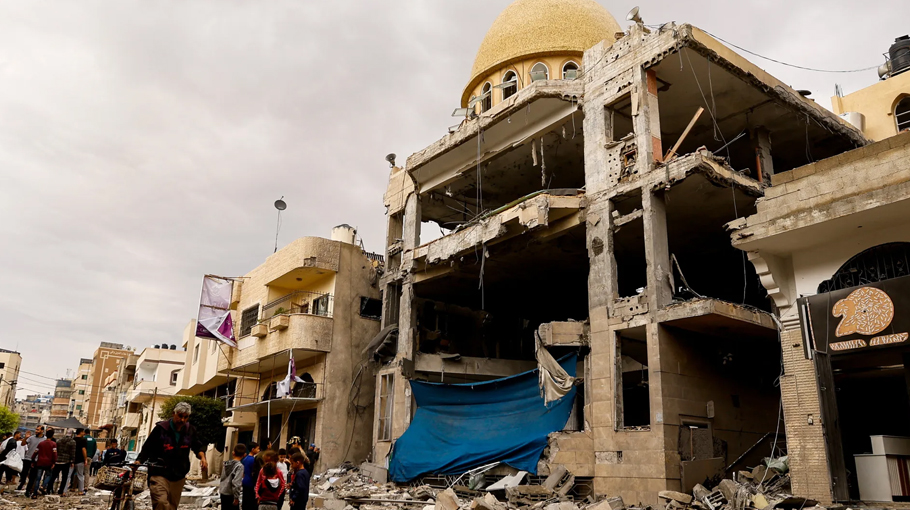Israel orders Khan Younis evacuation in southern Gaza

Israel has told Palestinians in Khan Younis, the largest city in southern Gaza, to leave their homes.
The city hosts hundreds of thousands who fled northern Gaza as Israel began a ground operation against Hamas.
The new order suggests the military operations could soon move towards the south of the Gaza Strip.
Israel says the aim is to wipe out Hamas, following its attack on Israel on 7 October in which 1,200 people were killed and more than 240 taken hostage.
The Hamas-run health ministry in Gaza says more than 12,000 people have been killed by Israel since then, including 5,000 children.
On Saturday, Israeli missiles struck a residential building in Khan Younis, killing 26 people, a local health official said.
Israel has not yet commented on the incident.
But it has been dropping leaflets in the wider area, urging people to leave for shelters.
"We're asking people to relocate. I know it's not easy for many of them, but we don't want to see civilians caught up in the crossfire," Mark Regev, an adviser to Israeli Prime Minister Benjamin Netanyahu, told US network MSNBC on Friday.
Israel did not want to see "civilians caught up in the crossfire", Mr Regev said.
He said Israeli troops would need to advance into the city to remove Hamas fighters from underground tunnels, adding he was "pretty sure" those being urged to relocate "won't have to move again" if they head west, towards the Mediterranean Sea.
Mr Regev said the areas they were being asked to move to would "hopefully have tents and a field hospital", although no such plans have yet been publicised, and it is unclear if such facilities would be able to accommodate potentially well over a million evacuees.
Because the western areas are close to the Rafah border crossing with Egypt, humanitarian aid could be brought in "as quickly as possible", Mr Regev said.
Like elsewhere in the Gaza Strip, southern Gaza has been in the grip of a humanitarian crisis since 7 October, when Israel enforced a full-scale blockage.
There have been widespread reports of water, food and fuel shortages, as well as concerns about healthcare facilities and sanitation conditions.
Israel has launched near-constant air strikes across much of the Gaza Strip, as well as a ground incursion into northern Gaza, including reducing much of Gaza City - the enclave's largest city - to rubble.
The UN estimates that at least 1.5 million people in Gaza are internally displaced, with overcrowding a major concern. Many are sheltering in UN facilities, as well as hospitals, churches and public buildings.
Much of the recent fighting has centred on Gaza City's al-Shifa Hospital, where Israel says Hamas has been operating a command-and-control centre, which Hamas denies. Israel is yet to provide substantial evidence to back its claim.
Hundreds of people are reported to have left al-Shifa on Saturday, with one journalist who left the hospital telling the BBC "we raised our hands and carried white flags".
The Israel Defense Forces (IDF) have denied ordering an evacuation of the hospital, but said it had agreed to a request from a hospital director and was providing a "secure route" for those wishing to leave.
Hamas officials say 120 patients remain at the hospital, along with premature babies.
There are also reports that a UN school-turned-shelter in northern Gaza has been hit, with many casualties.
The Hamas-run health ministry in the Gaza Strip told the AFP news agency that at least 50 people had been killed in an Israeli strike on the Al-Fakhoura school.
BBC Verify has geolocated footage to the school that shows many people - including women and children - with severe injuries or lying motionless on the floor in different parts of the building.
There are more than 20 such casualties visible in the footage, and around half of these are seen in one particular room on the ground floor, which also shows signs of considerable damage.
An IDF spokesman told the BBC that he could not confirm it was an IDF strike and was looking into the incident.
The head of the United Nations agency for Palestinian refugees (UNRWA) Philippe Lazzarini said he had seen "horrifying images and footage of scores of people killed and injured" in one of his agency's schools "sheltering thousands of displaced".
"These attacks cannot become commonplace, they must stop," he said.




